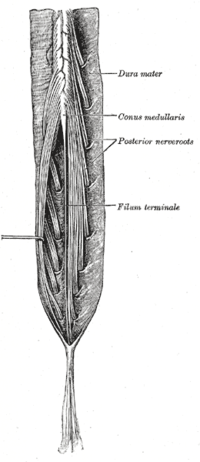
Photo from wikipedia
Gastrointestinal (GI) complications and their clinical implications are poorly characterized in dogs treated surgically for acute thoracolumbar intervertebral disc extrusion (TL-IVDE). The objective of this retrospective study was to characterize… Click to show full abstract
Gastrointestinal (GI) complications and their clinical implications are poorly characterized in dogs treated surgically for acute thoracolumbar intervertebral disc extrusion (TL-IVDE). The objective of this retrospective study was to characterize GI signs (including vomiting, diarrhea, melena, and hematochezia) in dogs undergoing hemilaminectomy for acute TL-IVDE. One-hundred and sixteen dogs were included. Frequency, type and severity of GI signs during hospitalization, duration of hospitalization and outcome were obtained from the medical record. Potential risk factors for the development of GI signs were explored using univariable and multivariable analyses. Gastrointestinal signs occurred in 55/116 dogs (47%); 22/55 dogs (40%) had one episode and 21/55 (38%) had ≥5 episodes. Diarrhea was the most common (40/55, 73%) while melena was rare (1/55, 2%). GI signs developed in 8/11 dogs (73%) treated perioperatively with both non-steroidal anti-inflammatories and corticosteroids with or without a washout period and in 25/52 dogs (48%) treated prophylactically with proton pump inhibitors. Median hospitalization was 7 days (4–15 days) vs. 5 days (4–11 days) in dogs with or without GI signs, respectively. Duration of hospitalization was associated with development of any GI signs, diarrhea and more severe GI signs (p = 0.001, 0.005, 0.021, respectively). Pre-operative paraplegia with absent pain perception was identified on univariable analysis (p = 0.005) and longer anesthetic duration on multivariable analysis to be associated with development of more severe GI signs (p = 0.047). In dogs undergoing surgery for acute TL-IVDE, GI signs were common and associated with duration of hospitalization and anesthesia. The influence of specific medications and neurologic severity on development of GI signs requires further investigation.
Journal Title: Frontiers in Veterinary Science
Year Published: 2021
Link to full text (if available)
Share on Social Media: Sign Up to like & get
recommendations!